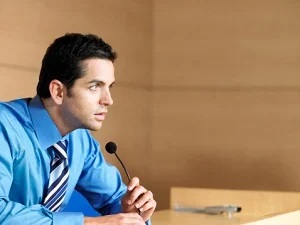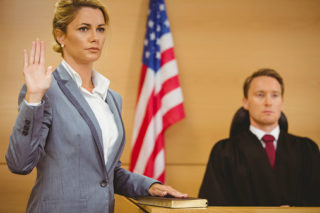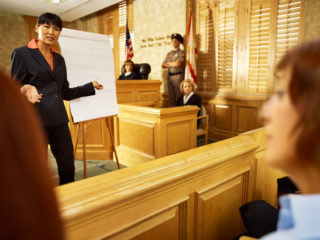Florida’s More Stringent Daubert Standard: Part 1
 Florida jurors are now considering more reliable expert testimony since the Florida legislature reformed the court’s role in precluding unreliable expert testimony. Starting July 1, 2013, the court has to follow the Daubert standard, which requires a judge to exercise greater scrutiny of the facts and data on which an expert’s opinions are based. As a result, Florida defense lawyers and their clients have a stronger arrow in their quiver to attack a plaintiff’s case that’s based on shaky expert opinions.
Florida jurors are now considering more reliable expert testimony since the Florida legislature reformed the court’s role in precluding unreliable expert testimony. Starting July 1, 2013, the court has to follow the Daubert standard, which requires a judge to exercise greater scrutiny of the facts and data on which an expert’s opinions are based. As a result, Florida defense lawyers and their clients have a stronger arrow in their quiver to attack a plaintiff’s case that’s based on shaky expert opinions.
Florida joined 39 other states that have adopted the Daubert standard – or at least a hybrid of the standard. But Florida’s adoption of Daubert probably resulted in a bigger evidentiary shift than other states’ adoption because Florida’s application of Frye had become so watered down. Florida judges were playing a more minimal role in keeping out “junk science” than other state judges applying the Frye standard.
Critics of Frye had argued that its standard was outdated and allowed the admission of expert testimony without testing the scientific rigor of the opinion. The Florida Supreme Court’s “pure opinion” loophole opened the gate even further to allow unreliable expert testimony. It essentially adopted an approach that allowed speculation to be a basis for an expert’s opinion. In sum, a treating physician’s “gut feeling” regarding causation of the patient’s symptoms was found to be sufficient basis so long as that “gut feeling” was tied to the treating physician’s experience. Many Florida attorneys felt this lowered the threshold for the admissibility of expert testimony – to the point where it would be pointless to challenge the admissibility of an expert’s opinion.
More specifically, in 2008, the Florida Supreme Court undercut the court’s minimal gatekeeping responsibility when it created a “pure opinion exception” to Frye (see Marsh v. Valyou). That opinion instructed trial courts that “Frye is inapplicable in the vast majority of cases.” In Marsh, the Florida Supreme Court found that testimony causally linking trauma to fibromyalgia was based on the expert’s experience and training, and was “pure opinion” admissible without having to satisfy Frye.” It further explained that Frye only applied when the expert “attempts to render opinion that is based upon new or novel scientific techniques.”
The “pure opinion exception” allowed experts to say to the jury, “It is because I say it is, based on my many years of experience.” Under Daubert, Florida’s “pure opinion” exception is referred to as ipse dixit – a Latin phrase meaning “He, himself, said it.” It conveys the notion that there is no support for the expert’s position other than the expert’s own opinion. Under Daubert, an opinion derived of mere ipse dixit of the expert is regularly excluded. The Daubert standard requires courts to screen expert testimony for reliability – that the testimony is based on sufficient facts or data, that it is a product of reliable principles and methods, and that the expert has applied the principles and methods in a way that reliably fits the facts of the case. The Daubert standard gives the judge more directives as to how the expert’s opinion must be supported. If it can be shown that the expert has not fully and fairly considered the facts of the case, or solely bases his opinion on his own subjective experience rather that a thoughtful scientific study and research, Florida courts will no longer allow such expert testimony to be heard by the jury at trial. In some product liability actions, a dismissal of a plaintiff’s expert will result in a dismissal of the case.
So why is this good news for manufacturers and their insurers in Florida? Because plaintiffs’ attorneys now have to scrutinize more carefully whether their case is propped up by credible expert opinions based on reliable principles and methods. This should eliminate some frivolous lawsuits. Also, it gives defendants an opportunity before a trial to test the sufficiency of plaintiffs’ experts’ opinions and perhaps get a case dismissed or settled before an expensive trial.
How do we make the most of this change for Florida defendants? Part of the challenge is educating the judge on his/her greater role and making sure that judge provides sufficient hearing time before trial to adequately perform this gatekeeping role. The Daubert hearing will likely require an evidentiary presentation with expert testimony that requires extra planning by defense attorneys from the beginning of the case.
Subsequent blogs on this topic will address in more detail why the plaintiffs’ bar was so against this change, how defense lawyers can take advantage of the Daubert standard in Florida state courts and what challenges Florida defendants are facing in their efforts to apply the Daubert standard to their cases.
This blog post was published originally on December 2, 2013.


 By
By


